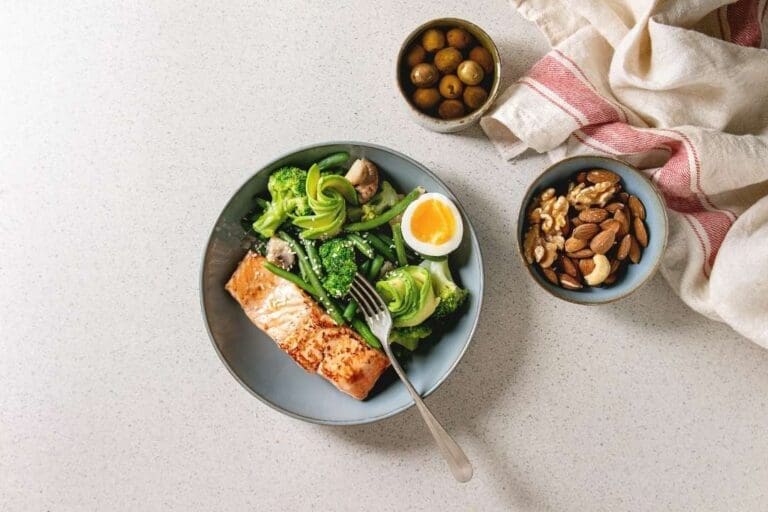Affiliate Disclosure: This post contains affiliate links. If you purchase through these links, we may earn a small commission at no additional cost to you. Thank you for supporting our blog!
Have you ever woken up feeling sluggish, bloated, or just off? Maybe you went to bed after a late-night snack, thinking nothing of it, only to wake up with low energy and brain fog. Most of us don’t realize that digestion is one of the most energy-intensive processes our body performs. When we eat too frequently or too close to bedtime, we don’t give our system enough time to reset, recover, and function optimally.
Giving yourself 12-14 hours between dinner and breakfast isn’t about restriction—it’s about allowing your body to do what it’s designed to do: heal, repair, and regulate itself. And one of the biggest mistakes people make? Eating too close to bedtime.
Let’s talk about why meal timing matters, how long you should wait between meals, and why stopping food intake at least 3 hours before bed can significantly improve your digestion, energy levels, and overall health.
Why Your Body Needs a Break From Eating
Your body is not meant to be constantly digesting food. In today’s world, with endless access to snacks and convenience foods, most people eat from the moment they wake up until right before bed. The problem? This keeps your body in a continuous fed state, never giving it a chance to shift into repair mode.
When you go 12-14 hours without food, here’s what happens:
- Blood Sugar Stabilization – Without constant insulin spikes, your body gets a chance to regulate blood sugar levels, preventing energy crashes and cravings.
- Fat Burning – Your body taps into stored fat for fuel instead of relying on a constant stream of incoming calories.
- Better Digestion – Giving your gut a break can reduce bloating, acid reflux, and discomfort.
- Cellular Repair & Detoxification – Your body activates autophagy, a process that removes damaged cells and supports immune function.
- Improved Sleep & Hormone Balance – Late-night eating can disrupt melatonin production and keep your body focused on digestion rather than deep rest.
Think of It Like This:
Imagine your digestive system as a hardworking factory. If the workers (your digestive enzymes and organs) never get a break, they become sluggish, inefficient, and overworked. But if you allow them a proper rest period, they come back stronger and more efficient, making everything run smoothly.
Why You Should Stop Eating at Least 3 Hours Before Bed
A lot of people believe a small snack before bed helps them sleep, but the truth is, late-night eating can actually make sleep worse. When you eat too close to bedtime, your body has to focus on digestion instead of rest, leading to poor-quality sleep and grogginess in the morning.
Here’s What Happens When You Eat Too Close to Bedtime:
- Digestion Slows Down – Your metabolism naturally decreases at night, making it harder for your body to process food efficiently.
- Blood Sugar Spikes – Late-night eating can cause insulin levels to stay high, increasing fat storage and making it harder to burn fat while you sleep.
- Poor Sleep Quality – Your body is focused on breaking down food instead of entering deep, restorative sleep.
- Increased Risk of Acid Reflux – Eating before bed can cause heartburn and indigestion, especially if you lie down too soon after eating.
A Simple Rule to Follow:
Aim to stop eating at least 3 hours before bed. If you sleep at 10 PM, your last meal should be by 7 PM. This allows your body enough time to digest properly before entering rest mode.
How to Start a 12-14 Hour Overnight Fast
If your last meal is at 7 PM, aim to have your first meal between 7-9 AM the next morning. This may feel like a big change at first, but your body will quickly adjust, and you’ll likely notice less bloating, fewer cravings, and more stable energy levels.
Simple Guidelines to Follow:
- Finish eating at least 3 hours before bed – If you go to sleep at 10 PM, be done with food by 7 PM.
- Stay hydrated – Drink water with electrolytes or herbal tea in the evening to curb cravings and support digestion.
- Break your fast with nutrient-dense foods – Avoid sugary breakfasts. Go for protein, healthy fats, and fiber to keep blood sugar steady.
- Keep it simple – No need to overcomplicate things. Just aim for a 12-14 hour fasting window and listen to your body.
Fun Ways to Keep Your Mind Off Late-Night Eating
If you’re used to snacking at night, it can be a tough habit to break. Here are some practical ways to make it easier:
- Drink a cup of herbal tea – Chamomile, peppermint, or ginger tea can help relax your body and signal that eating is done for the day. Try this chamomile tea!
- Try a magnesium supplement – This can help reduce evening cravings and improve sleep quality.
- Brush your teeth early – A minty fresh mouth can help curb the desire to eat more.
- Journal or read before bed – Engaging in a relaxing activity can shift your focus away from food.
- Take a short evening walk – Helps with digestion and signals your body to start winding down.
What to Expect When You Give Your Body This Healing Window
The first few days – You might feel hungry at night or wake up feeling extra hungry in the morning. That’s just your body adjusting.
After a week – You’ll notice fewer cravings, better digestion, and more stable energy.
Long-term – Blood sugar levels balance out, digestion improves, and your metabolism becomes more efficient.
This isn’t about dieting or depriving yourself. It’s about giving your body what it actually needs—a break.

Give Your Body the Break It Deserves
Taking 12-14 hours between dinner and breakfast isn’t a fad—it’s how your body is designed to function. And when you stop eating at least 3 hours before bed, you set yourself up for better sleep, digestion, and energy the next day.
Try it for a week and see how you feel. You might be surprised at how much better your body responds when you give it the break it needs.













